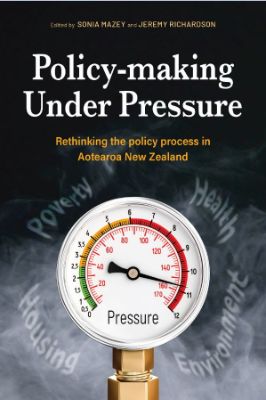Is The ‘Team Of 5 Million’ Well Governed?
A new book examines why all governments ‘stuff up’, why policies often fail and what practical steps we might take to improve policy-making in Aotearoa New Zealand.
University of Canterbury Adjunct Professors Sonia Mazey and Jeremy Richardson lift the lid on policy-making in the new collection Policy-making Under Pressure: Rethinking the policy process in Aotearoa New Zealand, published by Canterbury University Press.

Drawing on fascinating first-hand accounts from seasoned participants in the Aotearoa New Zealand policy process, Mazey and Richardson explain in an accessible and engaging way the difficulty of designing public policies that work in practice, especially in this era of pandemics and climate emergencies.
This publication is very timely. The recent arrival of the highly infectious, Delta strain of the COVID-19 virus in Aotearoa, though widely predicted by epidemiologists, has exposed the structural and systemic limitations of our current policy process, as well as the need for anticipatory policy-making.
Policy-making is never dull in the hands of Mazey, Richardson and their co-contributors, who include a former Prime Minister, several former Cabinet Ministers, former and serving senior public servants, pressure group leaders and commentators.
Real world policy-making is “messy and complex”, they write. Getting it wrong can have grave consequences, as highlighted by international examples of policy failure, such as British Prime Minister Boris Johnson’s “fumbling early responses to the COVID-19 pandemic”, which epidemiologists believe resulted in thousands of unnecessary deaths. Climate crisis inaction is another example of policy failure on a global scale.
In some policy sectors Aotearoa New Zealand is recognised as world leading, but we have significant challenges, as Mazey and Richardson remind us: “we have a long-standing housing crisis, increasing levels of child poverty and inequality, lower productivity levels and wages than comparable countries, declining educational standards, grossly polluted waterways and failing infrastructure”.
Why are policy failures, here and overseas, so common? One key cause the editors identify is that “democratic governments face a never-ending conveyor belt of new issues and demands from diverse groups to do something”.
As a consequence, policy-making typically becomes frenetic as governments resort to a range of agenda management strategies, which absorb resources and energy but often fail to address the underlying problem.
Mazey and Richardson draw on the personal reflections of the contributors to suggest major reforms to this country’s policy process, which are designed to improve analysis and introduce a more deliberative policy style. Suggested reforms include appointing ministers from outside parliament who have specialised policy knowledge, reforming public service recruitment and training, making greater use of independent policy commissions, and more effective consultation of those likely to be affected by any policy change.
As the editors point out, achieving good policy outcomes for all New Zealanders also requires a policy-making process enabled by and responsive to Te Tiriti o Waitangi and mātauranga Māori.
The goal of the book is to improve the policy-making process in Aotearoa New Zealand and defuse some of the ’wicked challenge’ timebombs ticking away in our policy landscape. Policy-making Under Pressure is a must-read for anyone interested in how the major issues of our time are being addressed and how better policy-making could lead to better outcomes for the ‘team of 5 million’.
Policy-making Under Pressure: Rethinking the policy process in Aotearoa New Zealand Edited by Sonia Mazey and Jeremy Richardson, Canterbury University Press, November 2021, $49.99, 316pp, 228 x 152 mm, softback, ISBN 978-1-98-850324-0.


 Gordon Campbell: On Why We Can’t Survive Two More Years Of This
Gordon Campbell: On Why We Can’t Survive Two More Years Of This NZTA: Forecast Strong Winds For Auckland Harbour Bridge Traffic
NZTA: Forecast Strong Winds For Auckland Harbour Bridge Traffic Queenstown Lakes District Council: Top 10 Most Hazardous Items Found In QLDC’s Waste Facilities And Rubbish And Recycling Bins In 2024
Queenstown Lakes District Council: Top 10 Most Hazardous Items Found In QLDC’s Waste Facilities And Rubbish And Recycling Bins In 2024 NZ Government: Drive Safely This Summer
NZ Government: Drive Safely This Summer Northland Inc: Game-Changing Investment For Northland - Resilience Fund Allocates $250,000 To Health Simulation & Training Centre
Northland Inc: Game-Changing Investment For Northland - Resilience Fund Allocates $250,000 To Health Simulation & Training Centre Interchurch Bioethics Council: Church Bioethics Agencies Express Dismay at the Rushed Consultation Period for Submissions on the Gene Technology Bill
Interchurch Bioethics Council: Church Bioethics Agencies Express Dismay at the Rushed Consultation Period for Submissions on the Gene Technology Bill New Zealand Police: More Than $2.5m Worth Of Assets Restrained In Undeclared Tobacco Case
New Zealand Police: More Than $2.5m Worth Of Assets Restrained In Undeclared Tobacco Case


